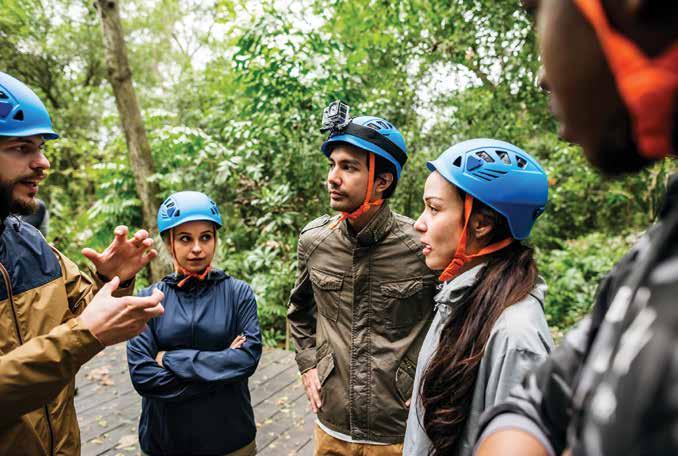
CHANGE YOUR LIFE. CHANGE YOUR WORLD. Vol 24 • Issue 2
to tend and to preserve
Gift
silver
of Traffic Walkers
ground
Think I Get It
communication secret
OUR WORLD Called
Becky’s
The
lining The Fellowship
Finding common
I
A
EDITOR’S INTRODUCTION
Why not?
For the New Year when I was six years old, I wanted to move to the mountains. My family had visited relatives who lived in a mountainous area over the Christmas holiday, and that was the first time I’d experienced the magic of so much snow.

Starting around Christmas and continuing well into January, I began praying earnestly for our family’s relocation. At first, I was confident that this would take place soon, but as February and March rolled by, it became obvious that no move was imminent. I eventually got over the childish fixation, but the question lingered in my mind much longer: Why had God not answered my prayer?
I realize now that God does always answer our prayers, but not always right away or always in the way we want or expect Him to. Sometimes He says “yes,” sometimes He says “no,” and sometimes He says “wait.”
As children, we would see something we wanted in a store, or something that our schoolmates had, and we were convinced it could make us happy and we would pray that God would provide that for us. Some of us still have this mentality and act as though God is like Santa, ticking items off our wish list.
God doesn’t answer some prayers the way we want or expect Him to because He knows that what we’re praying for would not really be good for us or others. Other times, God may have answered our prayer, but we simply don’t like the way He did it. If we’ve already figured out exactly what we want and are just asking God to provide it for us, but our plan isn’t what He knows is best, then He is doing the wise and loving thing in withholding our request.
What about me? In the years since I prayed that prayer as a child, which didn’t seem to materialize, I’ve enjoyed many snowy winters in several countries and settings. In my case, it turned out God’s answer was “Yes, in My time.”
For more information on Activated , visit our website or write to us.
Website: activated.org
Email: activated@activated.org
Local contacts:
South Africa:
Tel: (082) 491 2583
Email: sales@bigthought.co.za
India:
Email: activatedindia@activated.org
Nigeria:
Cell: +234 (0) 7036963333
Email: activatednigeria@activated.org
Philippines:
Cell: (0922) 8125326
Email: activatedph@gmail.com
Editor Ronan Keane
Design Gentian Suçi
© 2022 Activated. All Rights Reserved.
All scripture quotations, unless otherwise indicated, are taken from the New King James Version®. Copyright © 1982 by Thomas Nelson. Used by permission. Other Bible quotations are from the following sources: New Living Translation (NLT).
Copyright © 1978, 1996 by Tyndale House Publishers. Used by permission. New International Version (NIV). Copyright © 1978, 1984, 2011 by International Bible Society. Used by permission. Contemporary English Version (CEV). Copyright © 1995 by American Bible Society. Used by permission.
Vol 24, Issue 2
2
Environmental stewardship is a biblical mandate and commission from God. All of God’s creation is important to him, down to the last sparrow and blade of grass. We have wrongfully assumed that creation exists for our own consumption. We must get back to the heart of God. It is the responsibility of every true Christian to take stewardship seriously, and that includes environmental stewardship. We need to embrace the task to “tend the garden.”3
OUR WORLD
 By Keith Phillips
By Keith Phillips
The Bible tells us that when He had finished creating the heavens and the earth, “God saw everything that He had made, and indeed it was very good.”1 Then God appointed humanity to care for His creation and to manage its resources, not as owners, but as stewards. “The Lord God placed the man in the Garden of Eden to tend and watch over it.”2
But when God looks at His creation today, I’m pretty sure He is far less pleased than He was in the beginning. Much of the world is still beautiful and functioning the way He intended, but some parts have greatly deteriorated. Natural forces have taken their toll, but we humans have also played a part. Many of the earth’s ecosystems are failing, animal and plant species are becoming extinct, and resources are being depleted—and it is largely because of humanity’s failure to live up to our commission to “tend and watch over” what has been entrusted to our care.
We share in the responsibility and reap the consequences. Air and water pollution have reduced the quality of life for billions; global warming poses a serious, and increasingly imminent, threat to populations in coastal and low-lying areas; deforestation is creating new deserts; misuse of land and water resources is causing severe food shortages, displacing millions of people, and triggering conflicts in some regions; areas of our oceans, lakes, and rivers are becoming dead zones, devoid of life—all problems that are likely to get worse as world population continues to grow.
Granted, not all of man’s impact on the environment is harmful, and there is also disagreement over the best means to solve the environmental problems we face. The fact remains, however, that our collective home is in danger, and we each share in the responsibility for saving it. Working together and with God’s help, we can and must do better. A lot better.
Keith Phillips was Activated’s editor-in-chief for 14 years from 1999 to 2013. He and his wife Caryn now work with the homeless in the USA. ■
1. Genesis 1:31 2. Genesis 2:15 NLT 3. Genesis 2:15 3
Tri Robinson, pastor of Boise Vineyard Christian Fellowship Church
PRIORITIES IN MARRIAGE
By Maria Fontaine
I recently read about Tim Keller, a wellknown author, counselor, and pastor, who was diagnosed with stage four pancreatic cancer in May 2020. I admired the attitude he manifested when he was told that he would not live through this and what he had to say about his priorities for the time he had left on this earth.
When Dr. Keller was asked, “What are the things that you want to focus on, considering how short your remaining time in this life is going to be? What comes to the top of the list for you?” he said:
My wife, Kathy, and I are fairly well known as being a team. In many ways, we are joined at the hip.
Right after the cancer was diagnosed, we realized it wasn’t right to come to the end of our lives without improving our marriage in places where it could be better.

1. Tish Harrison Warren, “How a Cancer Diagnosis Makes Jesus’ Death and Resurrection Mean More,”New York Time s, April 10, 2022.
There were some things that she felt she could not talk to me about because I didn’t respond well, and she had given up trying to do it. But now we’re finding breakthroughs in being able to talk about certain things and deal with them in a way we were never able to before.1
I was very impressed by this, because if Tim Keller, living in the shadow of cancer, can make bettering his marriage one of his most important focuses, how much more should we be able to do that in our relationships.
Another thing I was very impressed by along these lines was a story of a man who was about to go through a divorce. He and his wife had tried everything, and nothing was working, but he loved his wife and he wanted to remain with her.
So he came up with the idea that every day he would ask her what he could do for her and do his best to accomplish it. The first times he asked her, she thought he was kidding when he would say, “Honey, what can I do for you today?” and she decided to test him and gave him
4
a big or difficult job like cleaning out the garage or doing an overhaul on the garden. She made it as hard as she could, since she didn’t think he would actually go through with doing what she asked.
But as he continued to ask her each day what he could do for her and then wholeheartedly put his strength and effort into doing those things, she started to believe that he really was determined to do whatever it took to convince her of his love. Through his willingness to perform actions that would serve as a tangible expression of his love, their marriage was saved.
When God is at the center of our marriage and He is the most important Person in our relationships, His love brings us into unity and oneness. When His love motivates us, we can know that we are pleasing Him, even if the response from our partner might not always be what we would hope for.
Giving love to others isn’t a contract designed to get what we want in exchange. It is a gift freely given without the expectation of reciprocation. Sometimes we do things for our partner, expecting them to reciprocate. We do something nice for them and we want them to do something nice for us in return. Many times, that will happen because love begets love, but we may not see that return come back to us in the way or at the time we hope for.

If we are motivated by what we expect to get back, then what we’re giving is not fully given in love. Let’s try to model Jesus’ love instead; He gave everything for us, knowing that we could never repay Him.
Maria Fontaine and her husband, Peter Amsterdam, are directors of the Family International, a Christian community of faith. Adapted from the original article. ■
BIBLE VERSES ON RELATIONSHIPS
Everyone should be quick to listen, slow to speak and slow to become angry.
James 1:19 NIV
A soft answer turns away wrath, but a harsh word stirs up anger.
—Proverbs 15:1
Stop being bitter and angry and mad at others. Don't yell at one another or curse each other or ever be rude.
—Ephesians 4:31 CEV
Finishing is better than starting. Patience is better than pride. Control your temper, for anger labels you a fool.
—Ecclesiastes 7:8–9 NLT
Above all, love each other deeply, because love covers over a multitude of sins.
—1 Peter 4:8 NIV
If I have the gift of prophecy and can fathom all mysteries and all knowledge, and if I have a faith that can move mountains, but do not have love, I am nothing. If I give all I possess to the poor and give over my body to hardship that I may boast, but do not have love, I gain nothing. Love is patient, love is kind. It does not envy, it does not boast, it is not proud. It does not dishonor others, it is not self-seeking, it is not easily angered, it keeps no record of wrongs. Love does not delight in evil but rejoices with the truth. It always protects, always trusts, always hopes, always perseveres. Love never fails.
—1 Corinthians 13:2–8 NIV
5
UNDER THE CROSS
By Rosane Pereira
A few years ago, I had a scary experience. I was coming to the end of a very full week and was already exhausted, when my daughter called from Chile explaining how she and her family had ridden out an earthquake by huddling under the frame of their entrance door. Then I heard that one of my grandsons was having pains in his chest because of rheumatoid arthritis, and the doctors feared for his life. All those thoughts came flooding into my mind when I lay down for a nap that Saturday—and when I woke up, my memory was gone!
I was fortunate that three of my adult children were visiting at the time, and they took care of me. I was aware and coherent, so the hospital suggested waiting a day to see how it would go. I was terrified that I wouldn’t recover my memory, but I did remember about prayer and I prayed many times for healing. After dinner, my daughter suggested that I should rest and listen to my Christian inspirational audios.
One of the audios was called “The Unchanging Christ.” In it, Virginia Brandt Berg tells of a cross that was built by the Portuguese navigator Vasco da Gama in Macau in the 16th century. It was very large and set on one of the walls of a stone cathedral. The cathedral was

eventually destroyed by time and typhoons, but the wall with the big cross was still standing in 1825, when, some people say, the future English governor of Hong Kong, Sir John Bowring, passed through there. The view of the majestic cross standing through the ages inspired him to write a poem called “In the Cross of Christ I Glory,” later turned into a hymn. The audio ended with another hymn called “Abide with Me” (1847).1
I could envision that big cross shining by the shore. The true story and hymns restored the serenity I needed. I felt peaceful and joyful and soon fell asleep. When I awoke the next morning, my memory was back to normal!
The situations I’d been worrying about have since been resolved. My daughter’s family is fine, as is my grandson. I’ve learned not to overdo physically or allow worry to overpower me anymore. Most of all, I’ve learned to cling to the cross that glows with peace and joy at all times, especially the difficult ones!
1. Ed: To hear the audio reflection, go to http://virginiabrandtberg.org/meditation-moments/mm114_the-unchanging-christ.html. 6
Rosane Pereira is an English teacher and writer in Rio de Janeiro, Brazil, and a member of the Family International. ■
FELLOWSHIPTHEOFTRAFFICWALKERS

I was fundraising for charity at a traffic light, and I noticed something interesting. Every time another person walked by, they would give me a sort of laughing smile and nod, and I would do the same. It was like everyone on foot had some kind of link or camaraderie. It was like some kind of momentary fraternity or fellowship between the people darting between cars and carefully navigating the yellow lines.
It got me thinking about the body of Christ and our interactions with one another. Ephesians 2:19 says “Now therefore ye are no more strangers and foreigners, but fellow citizens with the saints, and of the household of God.” This camaraderie and bond is meant to be visible, and we should be able to connect and relate to our fellow Christians on an immediate and profound level. When you see another follower of Christ pursuing their walk with Him, it should be an encouraging and confirming sight.
Unity within Christ is very important. As humans, we gravitate toward our “herds,” the groups of people that we identify with, relate to, and are similar to. As Christians, we can get distracted and caught up in denominations, doctrinal differences, and even cultures and upbringings.
ByAmyJoyMizrany
This prevents us from achieving the “good and pleasant” dwelling together in unity that the Bible discusses.1
When He was on earth, Jesus prayed for unity among those who believe: “I pray that they will all be one, just as you and I are one—as you are in me, Father, and I am in you. And may they be in us so that the world will believe you sent me.”2 This doesn’t mean that we should never disagree or have different opinions, but it does mean that we see each other as on the same team, in the same family, and with the same Great Commission—to share the good news of Jesus Christ with all we can.
The world is not our home, but we have a family of millions of brothers and sisters who go through trials and troubles and struggles just like we do. If people can bond over something as simple as being on foot in a busy street, regardless of what they’re doing or where they’re going, and see each other as experiencing the same things, we should be able to feel a connection to other believers who have similar faith and similar goals.
■
Amy Joy Mizrany was born and lives in South Africa, where she is a full-time missionary with Helping Hand and a member of the Family International. In her spare time, she plays the violin.
1. See Psalm 133:1.
2. John 17:21 NLT
7
I THINK I GET IT
By Jessie Richards
I boarded the plane that would take me home from a visit to Toronto, Canada. A gentleman came and sat in the seat beside me, talking on his iPhone. I recognized his South African accent, having attended a conference there the previous year.
Soon enough, Andrew and I were engaged in a lively conversation that lasted for the rest of the flight. He had a lot of stories to tell, and I mostly listened. I discovered he had experience in outdoor adventure team-building. For several years, his job had involved taking teams of coworkers, often executives, on adventurous outings into the South African bush—an experience that would, quite literally, stress them to their limits.
Andrew grinned as he told me in detail about the various dilemmas, puzzles, and challenges he would set up for these office-dwellers in the great outdoors. As they encountered situations where they were physically challenged, emotionally tested, and downright scared, they would start to become different people—people who had gained new perspectives and understood things about themselves and their coworkers that they hadn’t seen or understood before. When they returned home, most of them would get back to work with significant issues resolved.
That sounded to me like a fascinating prospect—to learn new things about myself and my coworkers by

8
testing my limits. I also thought about how engaging it must have been to be in his position—not just for the sheer adventure of being in interesting and exciting places, but for the opportunity to see others experience epiphanies and transformations.
It’s not every day that I get to talk to someone like Andrew, and I figured I could get some excellent tips and advice based on his years of experience in working with people from such an interesting angle.
“In all your years of team-building,” I asked, “what would you say has been the most common issue or problem that needed to be resolved among these groups of people?”
“Communication. The issue has nearly always been communication.”
“Because people who work together don’t talk to each other enough?”
“They talk plenty! What hardly anyone does enough of is listen.”
That was an Aha! moment for me. It sounded familiar enough, although I know I’m not nearly as good at listening as I should be. I said earlier that I mostly listened during our conversation, but that was because I really wanted to hear Andrew’s stories. In other circumstances, though, I don’t think I can say as much for myself.
Andrew went on to share how communication isn’t communication unless people understand one another. More often than not, people think they’ve communicated because they’ve said what they felt needed to be said, or have written what they felt needed to be written, but in reality, they don’t have a clue whether or not the other person understood them. Very often, the other person will have gotten a completely different idea than what the communicator intended.
To find out if you’ve communicated effectively or have understood what someone else was communicating, ask questions and—you guessed it—listen!
Not long ago I listened to a talk by Peter Kreeft, “One Thing Needed,”1 that built on my newfound listening lesson. He wisely stated, “Not many people can be great speakers. We can all be great listeners.” I think that sometimes I try too hard to be a good speaker, and forget that the majority of the time that’s simply not what people want or need.
Kreeft also said, “When we listen to each other, that’s rare, that’s special. Something always happens when we listen.” I do have a few recollections of times when I discovered something amazing by the simple act of shutting up and listening. Unfortunately, they are relatively few. I could have had so many more.
I don’t know that a lifelong resolution to listen more is realistic, but I am now trying to focus on finding people to listen to. Why would I want to limit myself to what’s in my own mind when I can gain insights from many minds—including, notably, God’s mind.
Something else just came to me about the beauty of listening: There are times in our lives—and now is one such time in mine—when we don’t feel we have a whole lot to give. We’re struggling, maybe we even feel a little lost. We want to help others, but what can we say that’s sure to help? Well, maybe there are situations when there isn’t anything we can say that would help. But everyone wants to be listened to and understood. If I can lend a listening ear, I’ll always have something valuable to give. Most likely, that will be more appreciated than whatever I could say anyway.
Jessie Richards had a role in the production of Activated from 2001 to 2012, and has written a number of articles as an Activated staff writer. She has also written and edited material for other Christian publications and websites. ■
1. See http://www.peterkreeft.com/audio/25 _one-thing-needed.htm 9
ZAREPHATH
By Joyce Suttin
“Have you something for me to eat, something to drink?” the unassuming stranger asked. “I’m weak from hunger and weary from my journey. Please, I beg you.”
My heart reached out to him. I felt the same hunger pains. Zarephath, where I lived, was like wherever this man had come from—in the grip of famine. I too was weak and weary. I too needed someone to rescue me before I perished.
I had almost nothing, and he was asking me to give him what little I had. If I’d had only myself to look after, I would have given him my last morsel without a second thought. I had given God plenty of reasons to turn His back on me. But what about my little boy, the light of my life, whom I adored?
“Come. … Of course, come in,” I answered haltingly. “But, you see, I have nothing to give you. I have only enough flour and oil to prepare one last meal for my son and myself before we die. We were gathering sticks for the fire when you came up the path.”
He was a handsome child, but gaunt now from having eaten very little for several weeks. A smile lightened his lips. He always had a smile. “Mother, I have found some sticks, too. The wind caused them to fall in the night. They will make a nice fire.”
The man looked deep into the child’s eyes. “Surely, the Lord has led me here,” he said.
I looked over at my boy, his curly brown hair tousled by the stiff breeze. His eyes were fixed on me, the way small children look at their mothers with expectancy and trust.
“Do not fear,” the man said. “Make me a small cake first, and then make some for yourself and your son. For thus says the Lord God, ‘The bin of flour shall not be used up, nor shall the jar of oil run dry, until the day the Lord sends rain on the earth.’”
I went to the shelf and took down the oil jar. It was light in my hands, nearly empty. Why was I doing this for a stranger? It didn’t make sense.
“Light the fire, my son, while I make the bread.”
I took the sack of flour from its bin. It too was nearly gone. As I kneaded the dough, a strange thing happened. Energy returned to my hands. My feet felt light as I took it to the oven. There was something different about this bread.

I struggled to ignore my hunger pangs as the room began to smell of freshly baked bread, and I avoided my son’s attentive gaze.
The man reached for the bread as I offered it to him. He held it up to God and said, “Lord, bless this food You

10
A RETELLING OF 1 KINGS 17:8–16
have provided, and bless these hands that have prepared it.” He turned to me and smiled. “Now make for yourself and your son.”
“But I have just used the last…” I hesitated. His eyes told me that I should just do as he said.
“Son, hand me the flour and the oil.”
The boy’s eyes were filled with wonder as he handed me the flour. The sack was heavier than it had been in days. Then he passed me the oil jar, and as he did, oil splashed on our hands. Our hearts, like the jar of oil, were full to overflowing.

And God was true to His word. What had once been only a handful of flour and a few drops of oil kept the three of us alive for nearly three years, until the famine had passed.
Joyce Suttin is a retired teacher and writer and lives in San Antonio, USA. Check out her blog at https://joy4dailydevotionals.blogspot .com/. ■
PAYBACK
The more you give, the more comes back to you, because God is the greatest giver in the universe, and He won’t let you outgive Him. Go ahead and try. See what happens.
Randy Alcorn (b. 1954)
In all of my years of service to my Lord, I have discovered a truth that has never failed and has never been compromised. That truth is that it is beyond the realm of possibilities that one has the ability to out give God. Even if I give the whole of my worth to Him, He will find a way to give back to me much more than I gave.
Charles Spurgeon (1834–1892)
A man there was, and they called him mad; The more he gave, the more he had.
—John Bunyan (1628–1688)
God wants to supply all your needs, physical and spiritual, through His Son, Jesus.1 You can invite Him into your life as your personal Savior by praying the following prayer: Jesus, I believe that You are the Son of God and that You died for me. Please forgive me for all my sins. I now open the door of my heart and I ask You to come in and give me Your gift of eternal life. Amen.
1. See Philippians 4:19.
11
THE FAITHFUL ONE
By Sally García
One of my favorite verses comes right around the middle of the Bible: “It is better to take refuge in the Lord than to trust in people.”1 The entire psalm is an expression of gratitude, admiration, joy, and praise to God, and the main point that comes across in this verse is God’s faithfulness.
When we can’t depend on others—even our family or our best friends—we know that we can always depend on God. He is infinite, omnipresent, omnipotent, omniscient, and the very spirit of love. We, on the other hand, are limited, learning as we go—usually through our mistakes. Even our best intentions often go awry because we don’t know how to accomplish what we set out to do. And, to be honest, our motives are often tainted by our personal desires.

1. Psalm 118:8 NLT
2. See Genesis 3:8–10.
3. See Genesis 18.
4. See Exodus 13:21.
5. See Exodus 33:11.
6. See 1 Samuel 3.
7. See Matthew 7:29.
8. See John 13:1.
9. See Matthew 27:46–54.
10. Matthew 19:26
11. John 14:23 NIV
From the very first stories of the Bible, we read of a present God, an active participant in the human drama. Imagine walking through the Garden of Eden with Him,2 or meeting with Him over lunch to discuss family matters, as Abraham did!3 He also led the Hebrews through the desert,4 spoke to Moses face to face,5 and woke up the child Samuel in the night to give him a prophetic message.6 There are so many similar stories throughout the Old Testament.
Then we meet Jesus in the Gospels. He lives among His disciples, walking with them in the market, by the seashore, teaching with authority7 and love.8 Even on the cross, He demonstrates His divinity and our insufficiency.9
When asked, “Who can be saved?” Jesus replied: “With men this is impossible; but with God all things are possible.”10
Clearly, even at our very best and most shining moments, it’s still better to trust in God than to put confidence in man.
And God knew that from the very beginning! The good news is that He still walks with us today. In fact, He’s hoping to come and live with you! Jesus said, “Anyone who loves me will obey my teaching. My Father will love them, and we will come to them and make our home with them.”11
Trust Him over all your other options and you will understand the significance of the truth expressed in Psalm 118:8.
12
Sally García is an educator, missionary, and member of the Family International in Chile. ■
BECKY’S GIFT
By Curtis Peter van Gorder
Becky was a fellow student I sat next to in 5th grade some 50 years ago. Something reminded me of her this morning and, one thing leading to another, a whole host of memories came flooding back. I vividly recall her smile and pleasant demeanor despite the fact that she must have been experiencing extreme physical and psychological pain. You see, she already knew her life would never be like her classmates’, because she had paralytic polio.
I remember her getting up in her awkward squeaky braces and shuffling along, struggling for every step. Even then, I was amazed at how she could cope. Here I was with all my limbs intact and in good health with my whole life ahead of me. My family was solidly middle class and I didn’t lack for anything I needed—and yet, I sometimes was less than grateful. Looking back, I can say I was rather spoiled.
Despite Becky’s struggles, she still remained positive and kept her faith in Christ. Her joyful spirit was a gift to me that spoke volumes.
In the first half of the 20th century, polio was still a very real problem and could strike anyone. The American President Franklin Delano Roosevelt was paralyzed from the waist down from polio. At its peak in the 1940s and 1950s, polio paralyzed or killed over half a million people worldwide every year. In the last few decades, polio was almost eradicated, but unfortunately it has more recently been detected again in some places where it had all but disappeared.
Although there’s more work to be done to completely turn the corner on this horrible disease, it’s encouraging to see how far we’ve come. It gives me faith that we can get through more current difficulties, like the Covid-19 pandemic, climate change, energy shortages, and other challenges that might come up. And even if we have to endure tragedy, we can remember and draw inspiration from the brave souls like Becky who endured and kept their faith through it all.
Curtis Peter van Gorder is a scriptwriter and mime artist who spent 47 years doing missionary activities in 10 different countries. He and his wife Pauline currently live in Germany. ■

He said, “My grace is all you need. My power works best in weakness.” So now I am glad to boast about my weaknesses, so that the power of Christ can work through me.
—2 Corinthians 12:9 NLT
13
EMPATHY AND COMPASSION
By Simon Bishop
Recently, I read a post that gave an interesting perspective on the stay-home orders or lockdowns throughout the world during the Covid-19 pandemic crisis. The author said that although “we were all going through the same storm, we weren’t all in the same boat.”
The point was that remaining home, for example, might have been seen as an opportunity for some, who got a break or the chance to explore new work schedules or to spend time with loved ones. For others it meant a loss of income, overly crowded conditions (or conversely, intense loneliness), and in some cases, even physical or mental danger.
I thought about this a lot as I read intense posts and articles either directed toward people who disobeyed quarantine orders, or toward the government for trying to impose them, or even just posts that take for granted that everyone has the same viewpoints—and if not, that the people who held different opinions were stupid, misled, or worse.
Some of this is addressed in the Bible, since human nature has always been quite self-centered, and Jesus constantly reminded His disciples and others around Him to have empathy and compassion and to try to look at things from others’ perspectives.
I’ve gathered a few verses on this topic, which I’ve found to be a help in reminding me to be empathetic and compassionate with those I come into contact with, even if their beliefs are different from mine.

Simon Bishop does full-time mission and humanitarian work in the Philippines. ■
Be merciful, just as your Father also is merciful. Judge not, and you shall not be judged. Condemn not, and you shall not be condemned. Forgive, and you will be forgiven.
—Luke 6:36–37
If you love only those people who love you, will God reward you for this? Even tax collectors love their friends. If you greet only your friends, what’s so great about this?
Don’t even unbelievers do that?—Matthew 5:46–47 CEV
Make me truly happy by agreeing wholeheartedly with each other, loving one another, and working together with one mind and purpose. Don't be selfish; don’t try to impress others. Be humble, thinking of others as better than yourselves. Don’t look out only for your own interests, but take an interest in others, too.—Philippians 2:2–4 NLT
Be happy with those who are happy, and weep with those who weep. Live in harmony with each other. Don’t be too proud to enjoy the company of ordinary people. And don’t think you know it all!—Romans 12:15–16 NLT
God loves you and has chosen you as his own special people. So be gentle, kind, humble, meek, and patient.
Colossians 3:12 CEV
Encourage each other and build each other up, just as you are already doing.
—1 Thessalonians 5:11 NLT
14
THAT BIG LOVE
By Marie Alvero
“Above all things have fervent love for one another, for ‘love will cover a multitude of sins.’”1
I have always been aware of love overlooking mistakes, inadequacies, quirks, and frustrating things about others. But this verse actually addresses love covering sin. Not just the random “I forgot to put that on my calendar,” or the friend that chews loudly. But sin—the things that hurt us, that separate us from God, that make it hard for us to love or forgive others, the things we know we could do better but aren’t really trying.
Let me tell you how this spoke to me, with my husband, my kids, my loved ones. In each of these wonderful people, I could identify things that are wrong—shortcomings, faults, and yes, sins. And of course, this goes both ways, and they absolutely can do the same with me! But sometimes I feel so little grace for them, and sometimes, I might even feel justified in my stance. I don’t want to compromise, to allow evil into our lives—but, really, who can be held to such a standard?
This is a hard concept for me to express, because I feel like it’s all too easy to consistently fall on one extreme
or the other—either “all grace,” which sometimes does flirt with compromise and acceptance of sin, or “all truth,” which leads me to being harsh and judgmental, unlike how Jesus would be. The reality is that both these extremes affect our usefulness to God and our relationship with others.
The balance is a place where truth can be exalted as it should be, but grace can be given, as it also should be. God’s Word provides a guide for life—and it can certainly change someone’s life—but I don’t have the ability to make anyone righteous, and that’s not my job. My job is to have love, which God’s Word says covers a multitude of sins.
I’ll think about that the next time my teenager has an attitude, or my husband doesn’t react to my friendly reminder in the way I’d hoped, or I hear my friend get angry at another driver as I’m on the phone with her, and I’ll try to cover it with that big, huge, amazing love that caused “Christ to die for us while we were still sinners.”2
Marie Alvero is a former missionary to Africa and Mexico. She currently lives a happy, busy life with her husband and children in Central Texas, USA. ■

1. 1 Peter 4:8 2. Romans 5:8 NLT
15
From Jesus with Love
START ANEW, START TODAY
Much of life is all about the little decisions you make every day. Decisions of the past have had their effect, but every new day can be a new start. No matter what has happened up till now, you have a chance to make the right decisions today.
Don’t waste time reliving the pain of past mistakes and wrong decisions. That only saps your power to do what you can do today. You can’t change the past, but you can make decisions that will build the future, starting right now, so take full advantage of the present.

Learn from past mistakes and put them behind you today. Forgive those who have wronged you and ask forgiveness from those you have wronged. That probably won’t be easy, but don’t put it off; do it today. Look to Me and My Word for fresh courage and hope, starting today. Dream new dreams today. Set new goals today. Spend your time on things that truly count today. Love your family today. Be a friend today. Do things better, starting today.
With My help, your future can be one of newness of life and a closer walk with Me—and it all starts today.



 By Keith Phillips
By Keith Phillips













